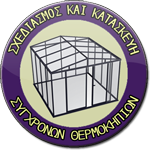
Design and Construction of Modern Greenhouses
November 28, 2024
Be(e) productive
November 28, 2024Hydroponics - Contemporary Expression of Agricultural Practice
Project Summary
In this training programme, participated 40 farmers cultivating vegetable crops from all around Greece and especially form Thessaly Region.
The emergence of a dynamic Thessaly Regional of Greece with a distinct quality and innovative technology, agri-food and cultural identity in Europe and internationally and is structured by the following objectives:
- Strengthening the competitiveness of Thessaly local products and services, especially products of certified quality.
- Protection, improvement and sustainable utilization of natural and built environment and natural resources, connection between environment and economy.
- Human resources development and improving employment conditions.
- Promotion of interregional and international cooperation.
The strategy for the restructuring of crop production requires the application of integrated management systems (IMS) to reduce input costs, improving product quality, soil conservation, saving water resources and protect the aquifer, development new varieties and general production of economically viable farms.
Integrated Management Systems recommends a restructuring of Production System with emphasis on improving the skills of farmers, product quality and protect and enhance the environment of the region of Thessaly.
This project was aiming to improve the skills of farmers through training and practical experience in a European IMS encouraging them to pursue their activities in agricultural exploitation or create new ones, within the framework of known rules and operating conditions. In particular, the immediate educational objective was the training of trainees in vegetable crops in the environment of a greenhouse using the technique of hydroponic cultivation. Training and practice were related to the necessary cultivation that the participant have to make in order to get the best quality products at the lowest possible cost.
Also the aim was to make participants able to produce products based on the integrated approach, ie, economic production of high quality products with eco-safer methods combining the cost effectiveness and quality (= competitiveness) and environmental (= security, conservation of natural resources, sustainability) aspect of cultivations.
Through the training, transfer of knowledge of modern hydroponic greenhouse-IMS farms were achieved and emerged the advantages of hydroponic cultivation in relation to:
- conventional farming on soil
- reducing the energy requirements of heating in greenhouses
- limiting the application of agrochemicals in the soil and the resulting pollution of soil-groundwater.
- tracing practices, non-typical methods that complement the scientific ones, on the cultivation of the above types of crops
- extraction of knowledge about the operation of fellow farmers in the region of Andalusiainvestigation and pursuing ways for international cooperation
This aim was not intended to replace the role of the agriculturist but to create conditions for a farmer who can "discuss", evaluate, propose etc. The collaboration of agriculturist scientist and the trained farmer is the first prerequisite for creating IMS crop, development of the primary sector, increase farmers income that may be help and the other two sectors of the economy by creating multiple benefits.
The project took place in Almeria during March 2012 in two different training flows and the hosting organization was Asociación de Organizaciones de Productores de Frutas y Hortalizas de Almería (COEXPHAL).





